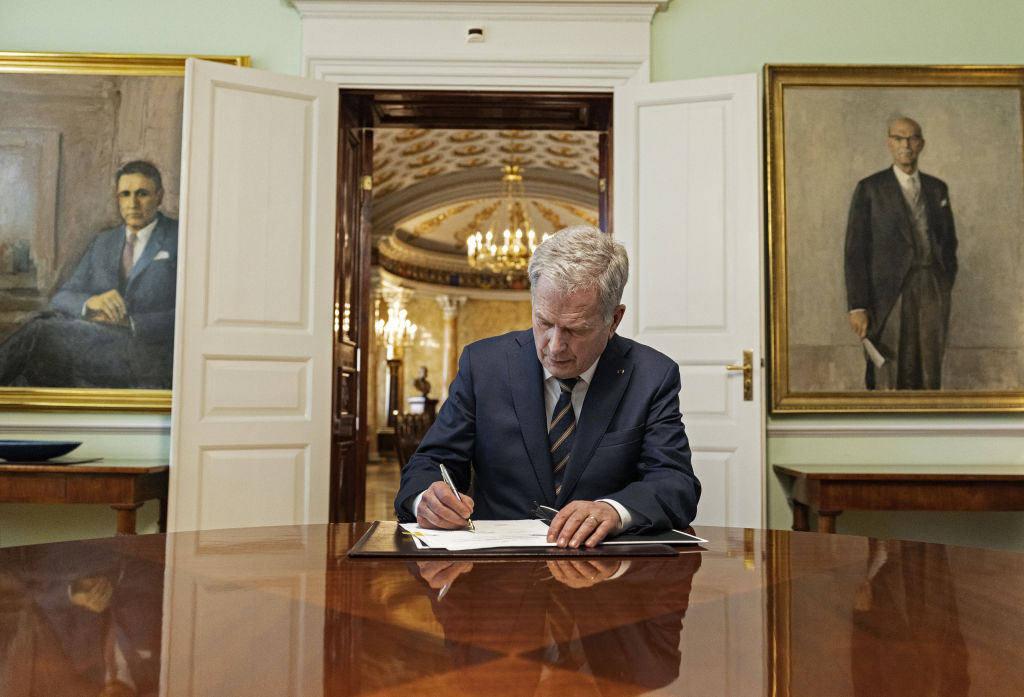Finland’s President will attend a ceremony at the NATO headquarters in Belgium today to mark the accession of the Nordic nation to the military alliance, the 12th new member this century.
The North Atlantic Treaty Organisation (NATO) has a new member today in Finland, a northern European state with a considerable land border with Russia. Yet today’s accession is one less than first thought as Sweden, who co-applied with Finland in May 2022 and was ratified as a joining member that July, continues to have its membership blocked by Turkey.
While the block may be frustrating for Sweden, it is rooted in the key functions and rules of the NATO alliance to which they wish, in time, to sign up to. Because under article five of the North Atlantic Treaty requires all members to come to the aid of any member which is militarily attacked admitting new members is a serious commitment, each member is given a total veto over new members.
As expressed in the founding document of NATO, “an attack against one Ally is an attack against all”.
#NATO Secretary General @jensstoltenberg will hold a joint press point with President @niinisto on 4 April at 15:00 CEST. The flag-raising ceremony for #Finland’s accession will follow #ForMin
ℹ️: https://t.co/jrUgi7KF3Y pic.twitter.com/EOCEIhNaLc— Oana Lungescu (@NATOpress) April 3, 2023
While Turkey does not appear to be seriously against Sweden joining NATO — they also slowed Finland’s membership for similar reasons — they are blocking the country for now because it has become a safe haven for Kurdish dissidents, who Turkey determines to be terrorists. While Turkey is ostensibly a secular state, it has taken a severe Islamist turn under the leadership of present strongman president Erdogan, and Turkey has also demanded Sweden ban attacks on the Islamic holy book, the Qur’an.
Those disagreements aside, NATO’s leadership have said they still hope to onboard Sweden this year.
Today, Finland’s President, Foreign Minister, and Defence Minister will be present at NATO’s headquarters at Brussels in Belgium for the final practical steps making the membership official, and ther ceremonies associated with that. Because the U.S. is the depository for the Treaty of Washington which founded NATO in 1949, the Finnish foreign minister will give its instrument of accession to the U.S. State Department today, which will be added to the other NATO treaty documents and making Finland the 31st member of the Alliance.
A flag-raising ceremony at NATO’s Brussels base will take place on Monday afternoon to mark Finland’s accession, and Finland’s President Niinistö will meet and speak with NATO Secretary General Jens Stoltenberg.
Speaking on Monday, Stoltenberg hailed Finland’s membership and said that while Sweden hadn’t joined yet, their neighbour becoming a NATO member would increase their security in the meanwhile. He said: “This is a history week. Tomorrow we will welcome Finland as the 31st member of NATO, making Finland safer and our alliance stronger. We will raise the Finnish flag for the first time here at the NATO headquarters. It will be a good day for Finland security, Nordic security, and for NATO as a whole.”
Finland and Sweden, although Sweden in particular, have like a handful of European nations enjoyed decades of armed neutrality, preferring to keep out of conflicts to whatever extent possible from the World Wars to the Cold War. The success of that neutrality has varied, with some of those nations invaded or subject to considerable influence in those conflicts even if they weren’t declared combatants.
Yet this policy came to an abrupt end for the Nordic neighbours with Russia’s invasion of Ukraine shattering any illusion about the sincerity of Putin’s claims about expanding his territory. Finland has already lost territory to Russian invasion in the past century.
The announcement that Finland was joining NATO today came the same day as the results to the country’s general election, which revealed the governing party which had taken the country into the alliance had slipped to third place and was seemingly to be replaced with a right-wing coalition, potentially with right-populist support. While the timing of these events could have thrown events into confusion, it is the case that all major parties in Finland, including the populists and establishment left and right, support NATO membership, underlining the degree to which public feeling in the once-neutral nation has shifted with growing Russian aggression.

Sauli Niinisto, Finland’s president, signs a domestic law which ratifies NATO treaties in Helsinki, Finland, on Thursday, March 23, 2023. The country and its Nordic neighbor Sweden, also a long-time NATO opt-out, submitted their applications together with the shared hope of the countries joining together. Photographer: Roni Rekomaa/Bloomberg via Getty Images


